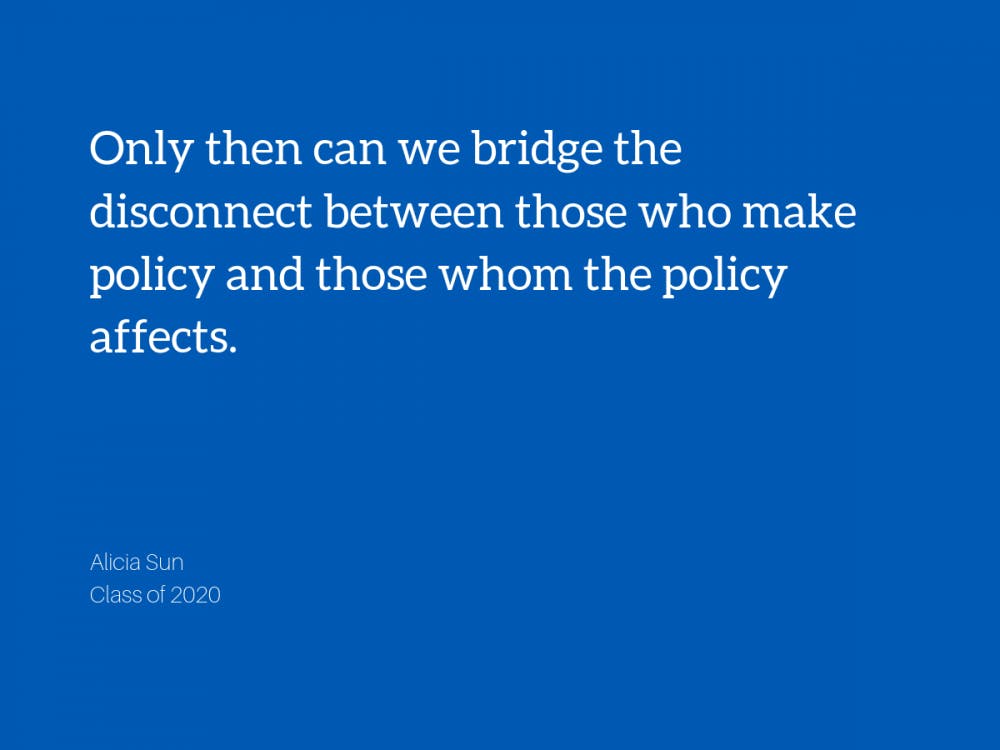Editor's note: This story is Part 2 in a series of columns by Alicia Sun exploring the history of labor at Duke. Part 3 will be published in early October.
Recognition, albeit rare, has come to workers in different ways.
George Wall, the first janitor employed at Duke, was born into slavery around 1854 but was emancipated as a teenager. Hired as a servant and later as a janitor, he devoted fifty years of service to the university. Wall died in 1930, but his legacy lives on in Walltown, the neighborhood he founded two blocks north of Duke’s campus, and the Walltown Health Clinic, a facility operated by Duke.
Since Wall, thousands of workers have helped to build and maintain the university, but very few have been memorialized in the way Wall has. Laborers like Lucius Jeter, an African American stonesman, built the school yet have no permanent memorial on our campus. Jeter worked on the foundations of West Campus in the 1930s and later on the Allen Building in the 1950s.
Although the labor force included blacks and whites, university documents reveal that Duke's campus was built mostly by underpaid black labor. The white laborers' stories, however, are far more visible. Even when black stonemasons are acknowledged in university documents, it is in patronizing language. They are usually referred to as "helpers" and considered not as qualified as white laborers. They also earned about 68 cents for every dollar their white counterparts earned.
In the latter half of the 20th century, issues arose in the treatment and wages of the maids and janitors. In a 1959 article in The Carolina Times, Duke students John Strange and Scott Stevens exposed the shockingly low wages of the university’s 225 nonacademic workers. Janitors were paid 90 cents an hour, and maids were making only 65 cents, amounting to $19.50 per week. Beyond low wages, the maids and janitors had no holidays or sick leave. Times Publisher L.E. Austin referred to these conditions as “peonage”.
Oliver Harvey, a janitor at the time, had long been aware of this injustice and was building momentum for unionization and collective bargaining efforts. He founded Local 77 in 1965, a union for Duke workers, and would frequently give speeches before students about the dignity of work. His calls to action were reflected in the Silent Vigil of 1968, the largest student demonstration in Duke's history in which students demanded collective bargaining rights for nonacademic employees and advocated against racial discrimination.
Sixty years later, the fight continues. As of 2019, Duke employs 701 full-time service workers, 85% (595 workers) of which are minorities—520 blacks, 106 whites, and 55 Hispanics. Although the wage has increased to a closer-to-living $15 per hour (substantially above the federal and state minimum wage of $7.25 per hour), the most recent change to housekeeping schedules has required Duke’s residential housekeeping staff to work weekends, with the same number of hours and pay, at the alleged request of the students. Under the rules, housekeepers have less time to spend with family, attend religious services, or tend to other obligations.
Shawn Easterling, who protested the move, is facing consequences. “I’m under suspension right now for failure to come in on Saturdays and Sundays,” he says. Back at home, Easterling has a lot to deal with; weekends are precious. As he told me, “My Saturdays and Sundays are important to me and my family, considering we just lost our son, who was 10-years old, last year—Thanksgiving Eve. So between that and dealing with the loss of our child, our religious beliefs are very important to us. We're dealing with that the best we can, and to come here and have to deal with what I'm dealing with, which is not just affecting me but affecting my family as well.”
Maybe if management had taken the time to understand their workers, to talk to them and listen to their concerns, they wouldn’t have been so quick to suspend Easterling. He believes the administration could improve working conditions by adhering to a simple concept: be human.
“Understand that you’re a human being and that you have human beings working for you” would be his advice to leadership. “Every day is not a good day for us and every day is not a good day for them, either. It would help if they understood that.”
Throughout Duke’s history of labor, there has been a common thread: a lack of empathy for its workers. For people like Easterling and Gooch, that thread persists to this day. As the Duke community begins to rethink its labor policies and practices, it’s important that we understand the experiences and contributions of people like Oliver Harvey and Shawn Easterling. Only then can we bridge the disconnect between those who make policy and those whom the policy affects.
Alicia Sun is a Trinity senior. Her column runs on alternate Thursdays.
Get The Chronicle straight to your inbox
Signup for our weekly newsletter. Cancel at any time.

